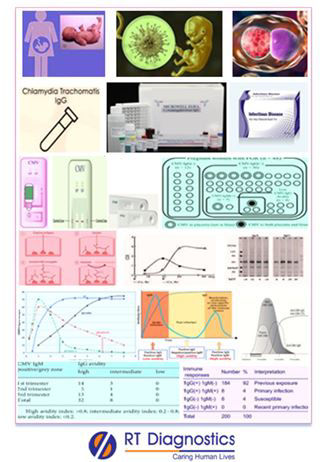CHLAMYDIA TRACHOMATIS IgG:
Why Chlamydia trachomatis IgG Test ?
CLINICAL INFORMATION
Chlamydia trachomatis is a gram-negative obligate intracellular bacteria (intracellular parasite pathogen) that causes acute and chronic diseases in mammalian and avian species. The genus Chlamydia is comprised of four species: C.trachomatis, C.pneumoniae, C.psittaci, and C.pecorum It is the most common sexually transmitted bacterial infection, spreads through sexual contact, is known to affect other organs (if left untreated), and can cause conjunctivitis, pneumonia, and/or blindness. Infection may cause complications in pregnancy such as it can lead to tubal pregnancy (due to tubal occlusion), ectopic pregnancy, induce abortion or child delivery, and also can cause pelvic inflammatory disease (PID – cervicitis (mucopurulent cervicitis), endometritis/salpingitis, urethritis, etc), infertility in women. It can also increase susceptibility to other diseases like HIV. Chlamydia trachomatis infection can also affect the genitor-urinary tract, rectum and also result in certain inflammations like perihepatitis and reactive arthritis. Up to 70% of women and 30% of men may be asymptomatic (symptoms may not develop until weeks after their initial exposure). Some of them who get infected may experience a burning sensation during urination, abnormal discharge, itching, irritation, and/or pain around the genitals. The infected person’s immune system produces 3 types of antibodies (IgM, IgA, IgG) against this Chlamydia infection (STD). Blood testing of Chlamydia infection is used as a helpful tool used in confirming Chlamydia infection for someone who has symptoms but has had inconclusive results. IgM antibodies – these typically develop shortly after infection and fade out after time. The presence of IgM indicates a recent infection. IgG antibodies also begin to develop during the same time, as the levels of IgM recedes the levels of IgG take over. IgG levels remain detectable even after the person has been treated successfully. Chlamydia trachomatis IgA– they are typically at their highest level during an active infection. If IgA results are negative and IgG is tested positive the patient may indicate past infection. While positive IgA and IgG tests indicate acute or chronic infection. In acute or reactivation of the disease reflects positive IgA but negative IgG test result. Clinical manifestations in women include abnormal vaginal discharge, bleeding between periods, pain during intercourse, and burning sensation during urination. In men, the symptoms include discharge from the penis, burning sensation during urination and pain or swelling in one or both testicles, etc. Chlamydia trachomatis IgG antibody test is an enzyme-linked immunosorbent assay (ELISA) for the detection of IgG class antibodies to Chlamydia trachomatis in human serum or plasma. Other tests include physical and clinical investigation (manifestations of signs and symptoms like strawberry rashes etc), genital Chlamydia urine test, etc.

General Instructions:
Sample Requirement: Specimen - Blood sample collected from the vein. Test Preparation: None.
NOTE - Sample for specimen collections may vary based on the patient’s condition/cases according to the patient’s presenting complaints/signs or symptoms:
SPECIMEN REQUIREMENT (Special or Rare Cases) - As instructed and guided by Physician / Clinician / Pathologist / as per Laboratory’s requirements, according to procedures and protocols.
Sample Requirement: Blood Sample taken from the vein
Test Preparation: None
This Multi-Specialty Clinical Referral Laboratory RT DIAGNOSTICS provides precise and accurate tests with an extensive range of testing services to the medical centers to help in the diagnosis and identification of pathology in the test specimens for infectious diseases and also to evaluate the function of organ systems of the patient. It prevents further complications and helps to stabilize and restore health to near normalcy at the earliest without delay.



